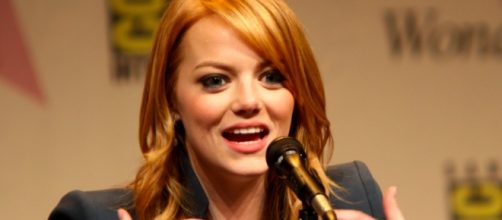“Battle of the Sexes” tells the true and outlandish tale of the 1973 tennis match between top female player Billie Jean King (Emma Stone) and ex-champ Bobby Riggs (Steve Carell).
King goes on a campaign for equal women’s pay after being refused identical winnings in the USLTA. With the help of her manager (Sarah Silverman), King creates her own league while insisting for equal pay. While on the road, King meets the alluring Marilyn (Andrea Riseborough), and a romantic fling between them ensues. Publicly, King seeks to end the gendered pay gap, while privately, she explores her sexuality.
Steve Carell dons sideburns and a wig to play Bobby Riggs. With his personal life in shambles and a tennis career that’s evaporated, 55-year-old Riggs believes he can revive himself professionally and personally by beating a slew of top-female players. Billie Jean knows this to be a sexist ploy that Riggs is using to garner attention for himself. Initially, she is opposed to the idea but eventually concedes to playing him.
Echoes of the 2016 election
Not surprisingly, the movie echoes the dynamics between presidential contenders Hillary Clinton and Donald Trump during the 2016 campaign. But instead of the studious and poised woman losing to an ostentatious and impetuous showman, the film reverses the outcome by insisting on the triumphs of womanhood in the face of hyperbolic and incompetent masculinity.
This point is made repeatedly as the lithe and well-prepared Billie Jean continually hammers against the bumbling Riggs in their famous Houston match.
Is Bobby Riggs’s likability problematic?
But despite these blatant parallels to the election, Bobby Riggs is perhaps the most likable character in the movie. He constantly demonstrates overt male-chauvinism and misogyny.
He has a gambling addiction and is a desperate performer, yet he remains the film’s most dimensional character. Riggs is frantically trying to carve out a space for himself on the national stage since his career as a World champion tennis player was cut short by World War 2. His is the type of character Carell excels at playing—outrageous yet someone we can extend our sympathy towards.
We see Riggs playing with his youngest son. He clearly is in love with his wife (Elisabeth Shue), and she, despite her frustrations with him, loves him in return. He’s a buffoon, but we still like him.
The film does take a pivotal stand on the ongoing struggle for women’s economic equality in the workplace, and it does give much-needed representation to LGBTQ people in a film industry where portrayal of queer lives is minimal at best. “Battle of the Sexes” proffers much of its time to showing same-sex female desire, and that’s to be applauded. But what does it say about the film’s project when its most likable character is also its most problematic?
Emma Stone plays an excellent Billie Jean King who is caught between exploring her identity as a lesbian and maintaining her relationship with her husband, Larry (Austin Stowell).
But Billie Jean King and Bobby Riggs are not equivalent characters, and yet “Battle of the Sexes” treats them as such. Billie Jean and her campaign for equality are the film’s major foci, but they are also joined by gratuitous amounts of screentime dedicated to Bobby Riggs. Thus, the film’s democratic vision of equal pay and queer liberation is seriously undermined by its vivid portrayal of a straight man whose misogyny is cloaked with likability.
The film hits select theaters on September 22.

